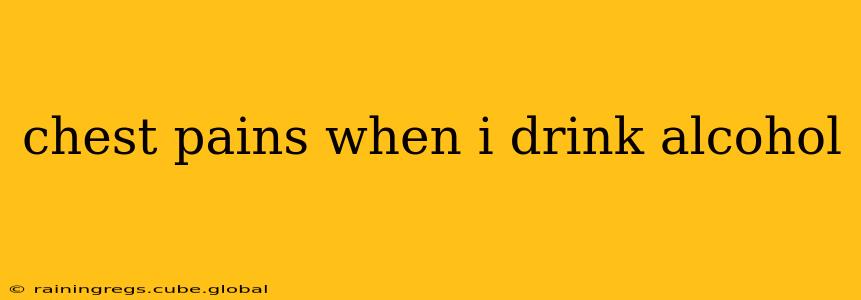Experiencing chest pain after consuming alcohol can be alarming. It's crucial to understand that chest pain is never something to ignore, and the cause can range from relatively benign to potentially life-threatening. This article explores various reasons why you might experience chest pain when drinking alcohol and emphasizes the importance of seeking immediate medical attention when necessary.
What Causes Chest Pain After Drinking Alcohol?
Several factors can contribute to chest pain after alcohol consumption. These range from simple indigestion to serious heart conditions. Let's delve into some of the most common causes:
1. Acid Reflux (Gastroesophageal Reflux Disease or GERD):
Alcohol relaxes the lower esophageal sphincter, the muscle that prevents stomach acid from flowing back into the esophagus. This relaxation allows stomach acid to reflux, causing burning pain in the chest, often mistaken for a heart attack. Alcohol can also irritate the esophageal lining, exacerbating the problem.
2. Heartburn:
Similar to acid reflux, heartburn is a burning sensation in the chest caused by stomach acid. Alcohol's effect on the lower esophageal sphincter makes heartburn more likely after drinking.
3. Pancreatitis:
Alcohol is a known trigger for pancreatitis, an inflammation of the pancreas. Pancreatitis can cause severe abdominal pain that can radiate to the chest. This pain is often intense and accompanied by other symptoms like nausea and vomiting.
4. Coronary Artery Disease (CAD):
While less directly linked, alcohol can exacerbate existing coronary artery disease. Alcohol consumption can increase heart rate and blood pressure, potentially stressing the heart and triggering chest pain, particularly in individuals already at risk for CAD.
5. Anxiety and Panic Attacks:
Alcohol, while sometimes used as a relaxant, can paradoxically trigger anxiety and panic attacks in some individuals. These attacks can manifest as chest pain, shortness of breath, and rapid heartbeat.
6. Pericarditis:
This condition involves inflammation of the pericardium, the sac surrounding the heart. While alcohol isn't a direct cause, it can sometimes exacerbate existing pericarditis, leading to chest pain.
Is Chest Pain After Drinking Alcohol Always Serious?
Not all chest pain after alcohol consumption signals a serious medical emergency. However, it's crucial to differentiate between minor discomfort and a potentially life-threatening event. Minor discomfort might be related to indigestion or heartburn, which can be managed with over-the-counter medications.
When Should I Seek Immediate Medical Attention?
Seek immediate medical attention if you experience:
- Sudden, sharp chest pain: This could indicate a heart attack or other serious cardiovascular event.
- Chest pain accompanied by shortness of breath, sweating, nausea, or dizziness: These are classic symptoms of a heart attack.
- Intense abdominal pain radiating to the chest: This might signify pancreatitis.
- Chest pain that worsens with time or doesn't improve with over-the-counter medication: Persistent or worsening pain needs immediate evaluation.
How Can I Prevent Chest Pain After Drinking Alcohol?
- Moderate alcohol consumption: Limit your intake to avoid overtaxing your digestive and cardiovascular systems.
- Eat before drinking: Food in the stomach can help buffer the effects of alcohol on the esophageal sphincter.
- Stay hydrated: Drinking plenty of water can help dilute the alcohol and reduce its impact on your system.
- Avoid mixing alcohol with other substances: Combining alcohol with other drugs or medications can increase the risk of adverse effects.
Disclaimer: This information is intended for educational purposes only and does not constitute medical advice. Always consult with a healthcare professional for any health concerns or before making any decisions related to your health or treatment. If you experience chest pain after drinking alcohol, particularly if it's severe or accompanied by other symptoms, seek immediate medical attention. Early diagnosis and treatment are crucial for managing and preventing serious health complications.
